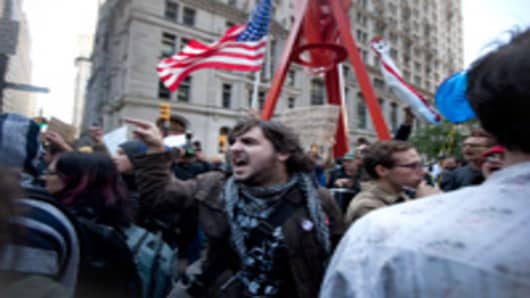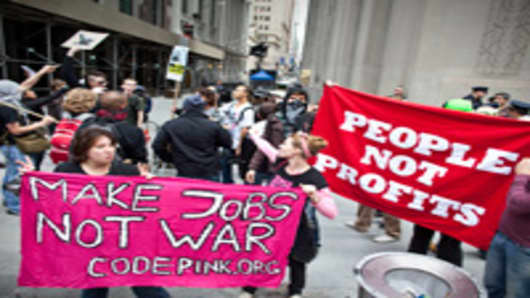A man named Hero was here. So was Germ. There was the waitress from the dim sum restaurant in Evanston, Ill. And the liquor store worker. The Google consultant. The circus performer. The Brooklyn nanny.
The hodgepodge Lower Manhattan encampment known as Occupy Wall Streethas no appointed leaders, no expiration date for its rabble-rousing stay and still-evolving goals and demands. Yet its two weeks of noisy occupation has lured a sturdily faithful and fervent constituency willing to express discontentment with what they feel is an inequitable financial system until, well, whenever.
They arrived by design and desire. Or by sheer serendipity.
Like Jillian Aydelott, 19, and Ben Mason, 20. They are a couple, both having taken an indefinite leave from school in Boston to travel across the country, very much on the cheap. Stopping in Providence, R.I., five days ago to sleep at a homeless shelter, they encountered a man who called himself Germ and said he was an activist. He was coming to the protest. They figured why not. They have yet to leave.
Ms. Aydelott’s feeling was: “Nothing is happening. People on Wall Street have all the power.”
The stalwarts seem to range from a relatively modest 100 to 300 people, though the ranks swelled to more than 2,000 on Friday as the protest began to attract mainstream attention from those disaffected with the weak economy and to enlist support from well-known liberals.
The actress Susan Sarandon stopped by, as did the Princeton professor Cornel West and former Gov. David A. Paterson of New York. A widely reported episode last Saturday, when four protesters were pepper-sprayed by a police commander, elevated the visibility of the demonstrators.
On Friday night, many marched to Police Headquarters to criticize what they described as the improper tactics that the police had used against their movement. (The police commissioner, Raymond W. Kelly, has defended the actions by the police, though he has said they will be reviewed.)
Nicholas Coniaris, 35, came to the makeshift village in Zuccotti Park near Wall Street on Friday and will be gone soon. He is from San Diego, a counselor who works with homeless veterans, and was squeezing in protesting while awaiting a wedding he was attending on Saturday. A friend from Japan, a fellow wedding guest, was here as well.
Having brought a tuxedo for the wedding, Mr. Coniaris decided to get extra mileage out of it. He wore it while he stationed himself in the center of the park clutching a coffee cup that said “God Bless,” and a sign that said, in part, “Support the Rich.”
“Just a little something,” he said mockingly to passers-by. “Half a billion dollars. I’m not asking for a trillion.”
After a couple of hours, his cup contained $1.15.
It all began when a Canadian advocacy magazine, Adbusters, posted a call for action on its blog in July. A New York group naming itself the General Assembly, inspired by recent meetings in Madrid, began to hold organizing meetings in Tompkins Square and other public places, leading to a Sept. 17 march near Wall Street. Shooed away from Wall Street, the protesters wound up in Zuccotti Park, which is bounded by Broadway and Liberty Street and has become their base.
Most of the demonstrators are in their teens or 20s, but plenty are older. Many are students. Many are jobless. A few are well-worn anarchists. Others have put their normal lives on pause to try out protesting and see how it feels.
Not all of them can articulate exactly why they are here or what they want. Yet there is a conviction rippling through them that however the global economy works, it does not work for them.
“I’m angry because I don’t have millions of dollars to give to my representative, so my voice is invalidated,” said Amanda Clarke, 21, a student at the New School. “And the fact that I’m graduating with tens of thousands of dollars in loans and there’s no job market.”
Their politics zigzag wildly. An unemployed schoolteacher calls herself a fierce independent, while an employed teacher is a conservative. An anarchist photographer wants libertarianism to be reclaimed by the left.
“This is not about left versus right,” said the photographer, Christopher Walsh, 25, from Bushwick, Brooklyn. “It’s about hierarchy versus autonomy.”
A finance worker walked around with a dollar bill duct-taped over his mouth and carrying a pizza box, on which he had written, “I could lose my job 4 having a voice.” Nikita Nikitovich, 44, a New York Pilates teacher, was working as one of the protest’s media contacts. A 38-year-old bicycle messenger with a head shaved except for a long braid arrived early Friday by bus from New Orleans, and had been waiting for a protest to erupt since Hurricane Katrina. “That’s when we were shown the big picture,” she said.
For all the bedraggled look of the mattress-and-sleeping-bag-strewn camp, it has a structure and routine. A food station occupies the center of the park, where donated meals are disbursed, especially pizza and Popeyes chicken. Sympathizers from other states have been calling local shops and pizza parlors and, using their credit cards, ordering food to be delivered to the park.
LIFE IN THE CAMP
There are information stations, a recycling center, a media center where a gasoline generator powers computers. At the east end sits the library, labeled cardboard boxes brimming with donated books: nonfiction, fiction, poetry, legal. There is a lost and found.
A medical station was outfitted with bins holding a broad array of remedies: cough drops, Maalox Maximum Strength, Clorox wipes, bee pollen granules. The main issues have been blisters, including some from handcuffs, and abrasions.
There are also a few therapists. Some out-of-work protesters are depressed. They need someone’s ear.
Elsewhere is a sanitation station, with designated sanitation workers who sweep the park. The park is without toilets, a problem that many of the protesters address by visiting a nearby McDonald’s.
The encampment even has a post-office box, established at a U.P.S. store, and has been receiving a steady flow of supportive letters and packages. Someone from Texas sent a bunch of red bandanas, now draped on the necks of demonstrators. Others have sent camera batteries, granola bars and toothbrushes.
Two General Assembly meetings are held each day to conduct organizational business and work on objectives. “We meet every day to decide what our demands are,” said Hero Vincent, 21, an artist and singer from Charlotte, N.C., who has been here from the beginning.
Not allowed to use amplified sound, the protesters have devised their own means of communication. Each speaker says a sentence, and then everyone else repeats it, so it ripples outward. Decisions must be by consensus. Hand signals convey responses. For instance, holding your palms upward and wiggling your fingers means approval, while holding them downward means disapproval. Level hands mean uncertainty.
People are divided into committees, including town planning, child care, direct action and a de-escalation group charged with keeping things orderly. There have been a few arguments.
When will all this end?
One protester thought when the temperature fell below 50. Others were less sure.
Sid Gurung, 22, a student at the New School who enlisted because he said he was “extremely disappointed and angry that I have no future,” would agree to no timetable. “Our task is important,” he said. “We could be here for months. Our opponents are giants.”
Natasha Lennard and Colin Moynihan contributed reporting.



